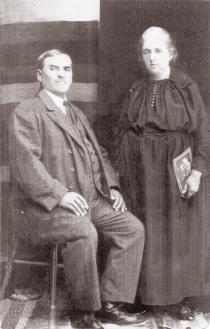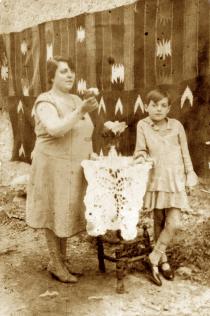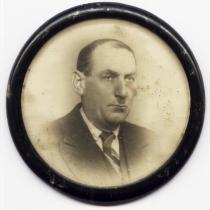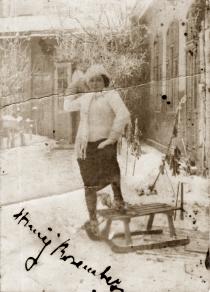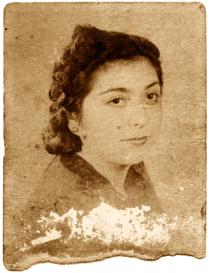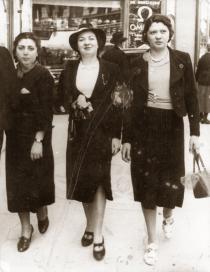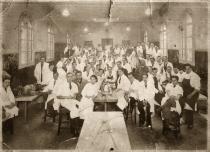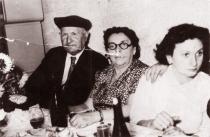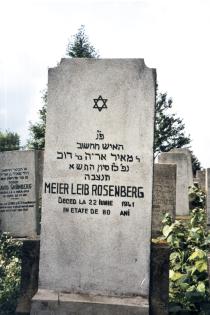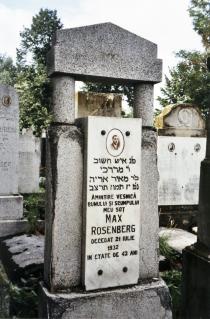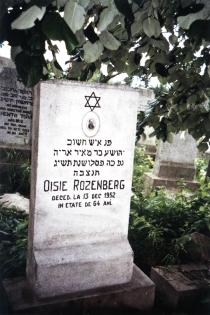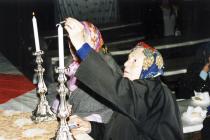This is my sister, Anuta Martinet (nee Rosenberg). This is a formal photo, taken in 1937 for her passport.
She was preparing to go to Italy, to study medicine in Padua. My sister’s dream had always been to become a doctor. After she graduated high school with the highest grades, she left for Iasi, to pass the admission exam at the Medical School. But in Iasi, those anti-Semitic movements had already begun. So she was inside that large hall, waiting to be registered for the Medical School. Two young students showed up and started asking questions: 'What's your name?' - 'Popescu.' - 'What's your name?' - 'Rosenberg' - 'Step to the other side. Popescu, go over there; you, Jews, move to the other side.' When the selection was over, the Romanians were taken to be registered for the exam, while the Jews were told: 'You, jidanii, go home. We have no need for Jewish doctors!' My sister immediately left the hall, went straight to the station, and took the first train home, to Bacau. She came back crying. 'What should I do?' My mother said: 'Well, you'll get married and that will be the end of it.' - 'But I didn't go to high school to return to the kitchen. You knew very well that I wanted to go to the Medical School from the very beginning!'
So she decided to go study abroad. And she left for Padua, Italy, because there were many students there, and there were also five or six Jews from Bacau who worked there. A former high school classmate of hers was going too, so my sister said: 'See, Anne Sarf is leaving, so I'll go to Italy with her. I'm leaving, no matter what; I'm going over there, I'll do anything, I'll scrub the floors in restaurants or I'll wash dishes if I have to. But I need to go to the Medical School!' So she left on 1st January 1938. She couldn't leave earlier because she had to get the necessary papers and all; and my father needed some time to raise the money, to find someone here whom he could pay and whose relatives in Italy would give my sister the same amount there, because money could not be transferred directly. And so she went to college.
Six months later, in June, when the 1st year was over, the exams came. She got the highest grades! The chairman of the examination committee congratulated her and asked her: 'Where are you from, Miss?' - 'Romania.' - 'How many languages do you speak?' - 'Romanian, French' - she mastered French and she knew a little German - 'and now', she said, 'I also speak Italian.' - 'And, may I say, your mastery of the Italian is better than a native Italian's, since you were able to express yourself the way you did in class and at the exam! For you, studying in Padua is a piece of cake.' She had figured that out herself. After all, there she was, only six months after her arrival, and she had got the highest grades and all her student-fellows wanted to touch her and carried her on their shoulders to bring them luck - you know how it is in college!
That summer, she came home and told our father: 'Father, I'm not going back to Italy. The classes there aren't bright at all. It's not what I had imagined I'd study. I'm going to France!' We had a relative there, Milu Stormann, the brother-in-law of one of my parents, who had also gone to the Medical School there, had married a French woman, and worked as a physician in some smaller town. Our father himself had spent four years in France in his youth. So he said: 'Well now, it's easier if you go to France, because we've got Milu there, we give the money to his parents here, and he will give you the same amount from his own money over there…' Because he really wanted to send some money to his parents in Bacau, but couldn't find a way, so this arrangement would suit him too. So she left for France, to Montpellier.

